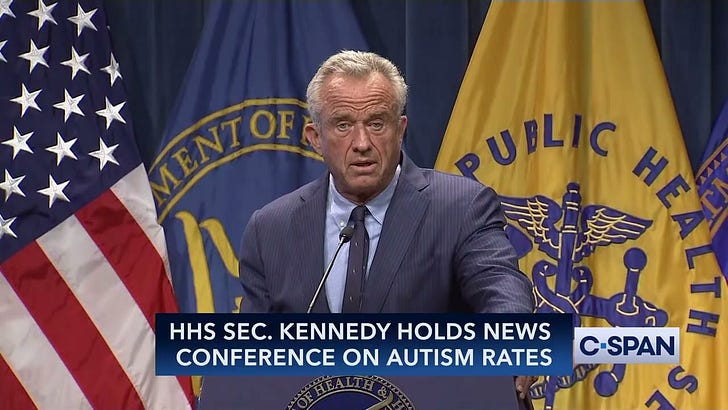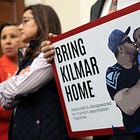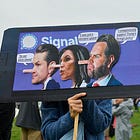🌈 With corporate outlets obeying in advance, supporting independent political media is more important right now than ever. Public Notice is possible thanks to paid subscribers. If you aren’t one already, please click the button below and become one to support our work. 🌈
Last week, Secretary of Health and Human Services Robert F. Kennedy Jr. launched into an ignorant and incendiary rant about autism.
“Autism destroys families, and more importantly, it destroys our greatest resource, which is our children,” he declaimed at a press conference.
Kennedy added of autistic children that “they'll never pay taxes, they'll never hold a job, they'll never play baseball, they'll never write a poem, they'll never go out on a date. Many of them will never use a toilet unassisted.”
Numerous autism advocacy groups, and many autistic people themselves, responded by pointing out that Kennedy’s comments are wrong and dangerous.
In the first place, many people with autism are not severely disabled. Autism is a complex condition, which can be characterized by behaviors such as stimming, difficulty processing certain kinds of sensory experiences, difficulty communicating, or difficulty socializing. It’s simply ridiculous to say in any blanket way that autistic people don’t write poetry or pay taxes, when many autistic people do just that.
Alexis Brown, a board member of the Gentry Foundation of Autism with two 15-year-old twin autistic boys, told ABC News, “Autism is a very broad spectrum, and it is not an epidemic. Our children play sports, are members of the National Junior Honor Society, serve as junior instructors in their jujitsu black belt club and do CrossFit. So let's debunk the idea that all children with autism will never use the toilet, never hold a job or never succeed in life.”
More, even when autistic people have deficits, that does not mean that autism “destroys” families or children. Autistic people are human beings, and they experience joy, have meaningful relationships, and are valuable, whether or not they jump through whatever hoops ghouls like Kennedy want to set up for them.
“Autism doesn’t destroy families. It’s the ableism that does,” Tyla Grant, who has been diagnosed with autism, told the New York Times.
Kennedy’s false and misleading comments channel an ugly history of discrimination against autistic and disabled people. They also are a terrifying signal of how Kennedy and the Trump administration view health policy, children, and the disabled.
Difference, for Kennedy, is not something to be accommodated, celebrated, or cultivated. It is a tragedy to be stamped out.
Autistic people are in danger when they are seen as disposable
Kennedy falsely claims that there is an “epidemic” of autism. Experts have pointed out that the rise in autism is due to new diagnostic criteria and to the increase in awareness of the condition. Kennedy, without evidence, says they are wrong because … well, because he wants them to be. He insists that autism is caused by environmental factors and especially by vaccines, even though this has been thoroughly debunked.
This is not a new debate. In his groundbreaking 2015 history of autism, “Neurotribes: The Legacy of Autism and The Future,” journalist Steve Silberman traced the long, convoluted history of autism diagnoses back to the early 20th century, and even before. Silberman argues that there have always been autistic people around. He provides a profile of inventor Henry Cavendish (1731-1810), the discoverer of hydrogen who was noted for his intense shyness, odd out-of-date dress, ritual everyday walks along the same routes, refusal to eat anything but mutton, and meticulous, even obsessive focus on his experiments.
A note from Aaron: Working with brilliant contributors like Noah takes resources. If you aren’t already a paid subscriber, please sign up to support our work.
Cavendish had a substantial personal family fortune, and so his neurodivergence was mostly treated as an eccentricity. Autism didn’t destroy him or his family, because they had the resources to accommodate it, to the great benefit of Cavendish and the scientific community.
However, in places and times where autistic people were seen as hopeless, broken, or worthless, they were often treated as disposable, or worse than disposable. Leo Kanner (1894-1981), a pioneer in diagnosis of autism in children, pointed to an account of a young girl in the 18th century who avoided contact with people and was afraid of the darkened church. Her family had her beaten and starved; the treatment quickly killed her.
The most hideous example is of course Nazi Germany, where autistic people, like most disabled people, were characterized as “life unworthy of life” in the phrase of psychiatrist Alfred Hoche and penologist Karl Binding. They also called disabled people “useless eaters” — eugenic language that chillingly evokes Kennedy’s concern that autistic people do not pay taxes.
Under the Nazis, Silberman writes, young children who were nonverbal, or who simply displayed behavior that was seen as annoying, were murdered. There were 789 killed at the Spiegelgrund clinic in Austria over five years; some 200,000 disabled people, children and adults, were killed under the Nazi euthanasia program. Many of these people were likely autistic.
The mistreatment of autistic people continued into the latter part of the 20th century, precisely because — like Kennedy — doctors and families thought that autism was rare, curable, and completely debilitating. Extreme treatments seemed justified to “save” children from the “disease.”
Leading midcentury researchers like Lauretta Bender and Ole Ivar Lovaas advocated for physically striking children and for electroschock therapy to punish them for behaving in ways which were considered abnormal. They also used drugs that produced convulsions or comas. Children who were institutionalized under such regimes often deteriorated badly, providing “evidence” that autistic people were incurable or unable to cope outside of institutional settings.
Parents intent on cures could also endanger or harm children. Withholding vaccines obviously put children at risk. Parents would also try batteries of drugs and restrict foods. Some parents as recently as 2019 have even poisoned their children with bleach. Focusing on cures diverted attention away from mandating accommodations.
The war on difference
Today, treatment of and accommodation of autism is generally very different, in part thanks to advocacy by parents of autistic people and by autistic people themselves. As scientist and animal expert Temple Grandin said, “If I could snap my fingers and be non-autistic, I would not. Autism is part of who I am.” Many autistic people who work in programming, in the arts, or even in writing political commentary (like me) might say the same.
Instead of trying to cure autism or make autistic people “normal,” autistic people now advocate for providing accommodations — like remote work options — that can help make it easier for them in the workforce. And they also advocate for recognizing that human beings are valuable no matter who they are or what they can do. All life is worthy of life.
The idea that people are different and that society should accommodate and even celebrate those differences is, of course, anathema to the Trump administration. Trump is attempting to undermine civil rights gains in what Adam Serwer has referred to as “the Great resegregation.” He’s mounting a withering, unrelenting attack on trans rights and trans people. The massive cuts to USAID programs — which could kill millions every year — is also an assault on foreign, non-white people who the current administration sees as worthless.
Kennedy’s disgust with and devaluation of autistic people fits neatly into this eugenic logic that views health as virtue, and sees illness, or difference, as a kind of moral lapse which should be subject to punishment or censure.
Television quack Mehmet Oz summed up this view in his swearing in ceremony as administrator of the Centers for Medicare and Medicaid last week when he declared, “It is the patriotic duty of all Americans to take care of themselves. It’s important for serving in the military, but it’s also important because healthy people don’t consume healthcare resources. The way to reduce drug spending is to use less drugs because you don’t need them because you are healthy.”
Everyone gets sick at some point; everyone needs healthcare resources. Blaming people for requiring care has historically been a way to justify horrific treatment of the disabled, including autistic people.
When Kennedy lies about autistic people, he puts autistic people at risk, as they have often been at risk in the past. But the attack on difference, the idea that people who are different are a tragedy and a burden and that they have nothing to contribute — that is fascism. And it is a danger to almost everyone.
That’s it for today
We’ll be back with more tomorrow. If you appreciate today’s newsletter, please support us by signing up. Paid subscribers make Public Notice possible.
Thanks for reading.







Noah, thank you for exposing the dilettante RFK, Jr for the ignorant, heartless, uninformed idiot that he truly is. His comments have rightly been answered with a tsunami of outrage. His niece, Caroline Kennedy Schlossberg, warned us about him before he was elevated to a job for which is is pathetically unqualified by another dangerous, unfit lunatic (Drumpf). Mehmet Oz is just another one of the cast of characters (Linda "A.1" McMahon also comes to mind) who are unserious and unqualified to serve. But, you see, that's the whole idea: appoint to destroy. And the madness continues.
Kennedy is not a doctor. He is not a scientist. He is an environmental attorney and therefore has a view of the world where effects have causes that he views as environmental. This precludes any other potential causes for autism, such as genetics, giving a false view of reality.
I just can’t with him.